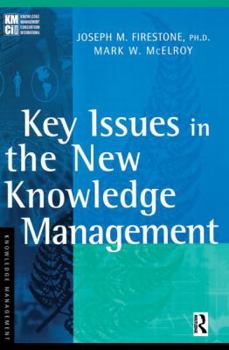Key Issues in the New Knowledge Management
In 'Key Issues in the New Knowledge Management, ' Firestone and McElroy, the architects of the New Knowledge Management (TNKM) provide an in-depth analysis of the most important issues in the field of... This description may be from another edition of this product.
Format:Paperback
Language:English
ISBN:0750676558
ISBN13:9780750676557
Release Date:June 2003
Publisher:Routledge
Length:384 Pages
Weight:1.56 lbs.
Dimensions:0.7" x 6.0" x 9.0"
Customer Reviews
1 rating
KM's Key Issues
Published by Thriftbooks.com User , 20 years ago
Key Issues in The New Knowledge Management, by Joe Firestone and Mark W. McElroy, is the book that goes on - in some respects - where The New Knowledge Management (Mark McElroy, 2002) stopped. The book discusses the New Knowledge Management model, discusses theoretical underpinnings, and provides food for conversation and discussion regarding topics such as metrics of knowledge management, the organization's social capital and knowledge management standards. Key Issues is one of the few works in the field of knowledge management that presents its model in a transparant way, open and ready to accept criticism. It is also a brave book, since it provides a an explicit knowledge theory, and normative stance to KM. More than enough edges to rub yourself against. However, the book does not seem to draw the ultimate consequence from the model, that positions KM as a source of corporate social innovation. The positioning is there, the argumentation strong, but there is no sign of practical elaboration of this aspect. Instead, this is left up to 'accountants', and it seems as if the authors define this aspect out of scope and remove it from their own working agenda. That is a missed opportunity, in view of the strong appeals made in TNKM, their earlier book. And it is contradicting the importance given to the issue in the model. The book counts 350 pages and eleven chapters. The first five chapters deal with a thorough reflection on knowledge theory, and its implications for a knowledge management theory. Chapters six to ten deal with The New Knowledge Management Model. And chapter 11 is called "Conclusions", although it is 45 pages long and an interesting read on its own. The authors carefully lay out the basic concepts of their model, taking a pragmatic and fallabilist perspective on knowledge. This means that knowledge development - a form of model construction - is led by pragmatic criteria. Knowledge is like a 'lense' used to define problems, develop acceptable solutions, and guide knowledge development. By making their model transparant, they provide openings to systematic scrutiny and discussion of their model. Even if the authors do not explicitly refer to it, I interpret the rationale of KM methodological approach to be an example of systematic, pragmatic model building. TNKM The KM model itself is laid-out in its various components as already available in my review of The New Knowledge Management, so that it is not necessary to discuss the model itself again. In view of the model-character of knowledge, the heart of the matter of organizational KM is: what are the models governing decision-making and organizational behaviour, what is the quality of those models, and how can we improve those models in case we see that things go wrong in practice? The questions above make KM vulnerable to being misused, and to KM practices being ineffective or even destructive. This will be the case if KM practices are being used in a situation where basic ass






